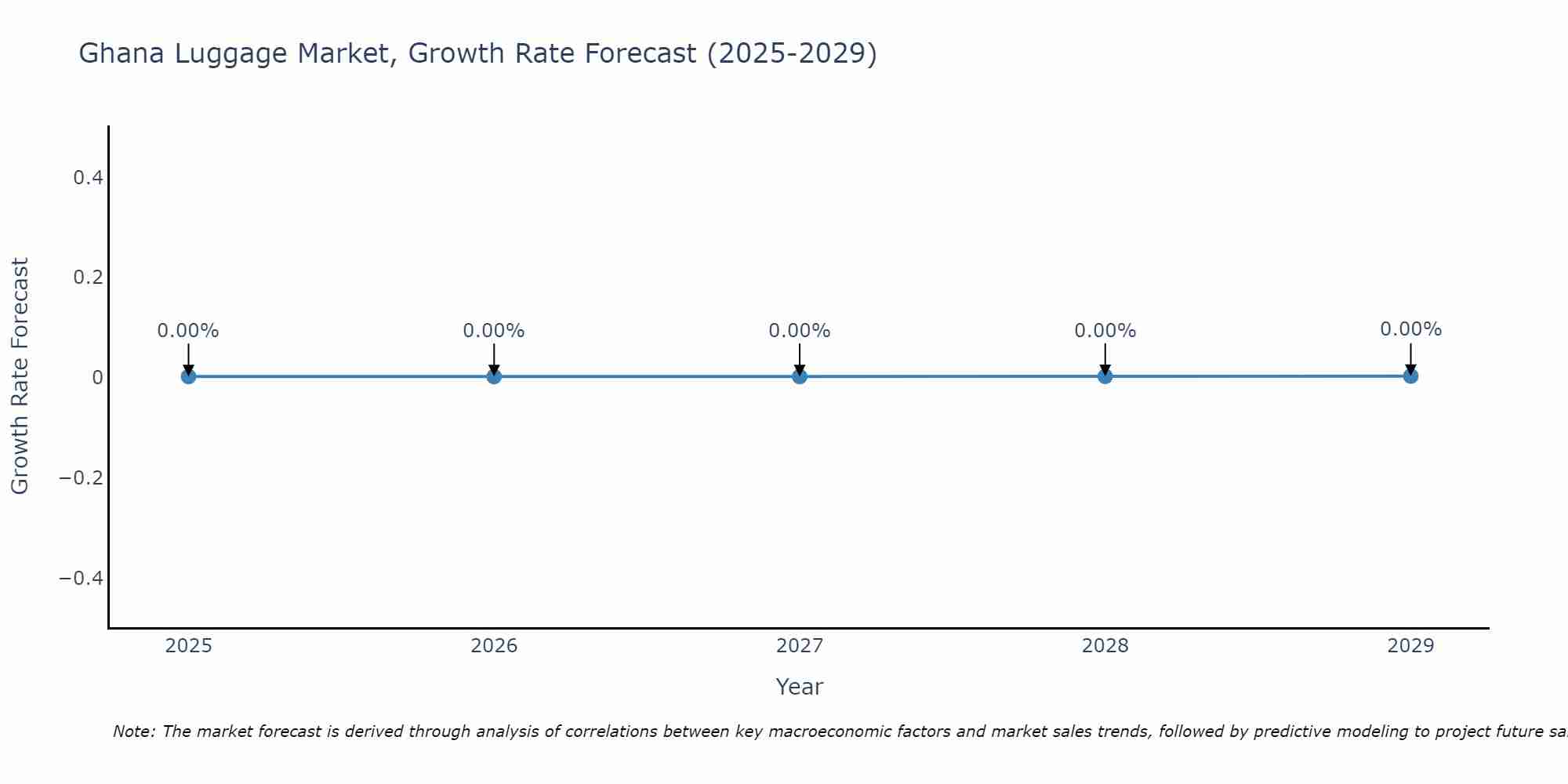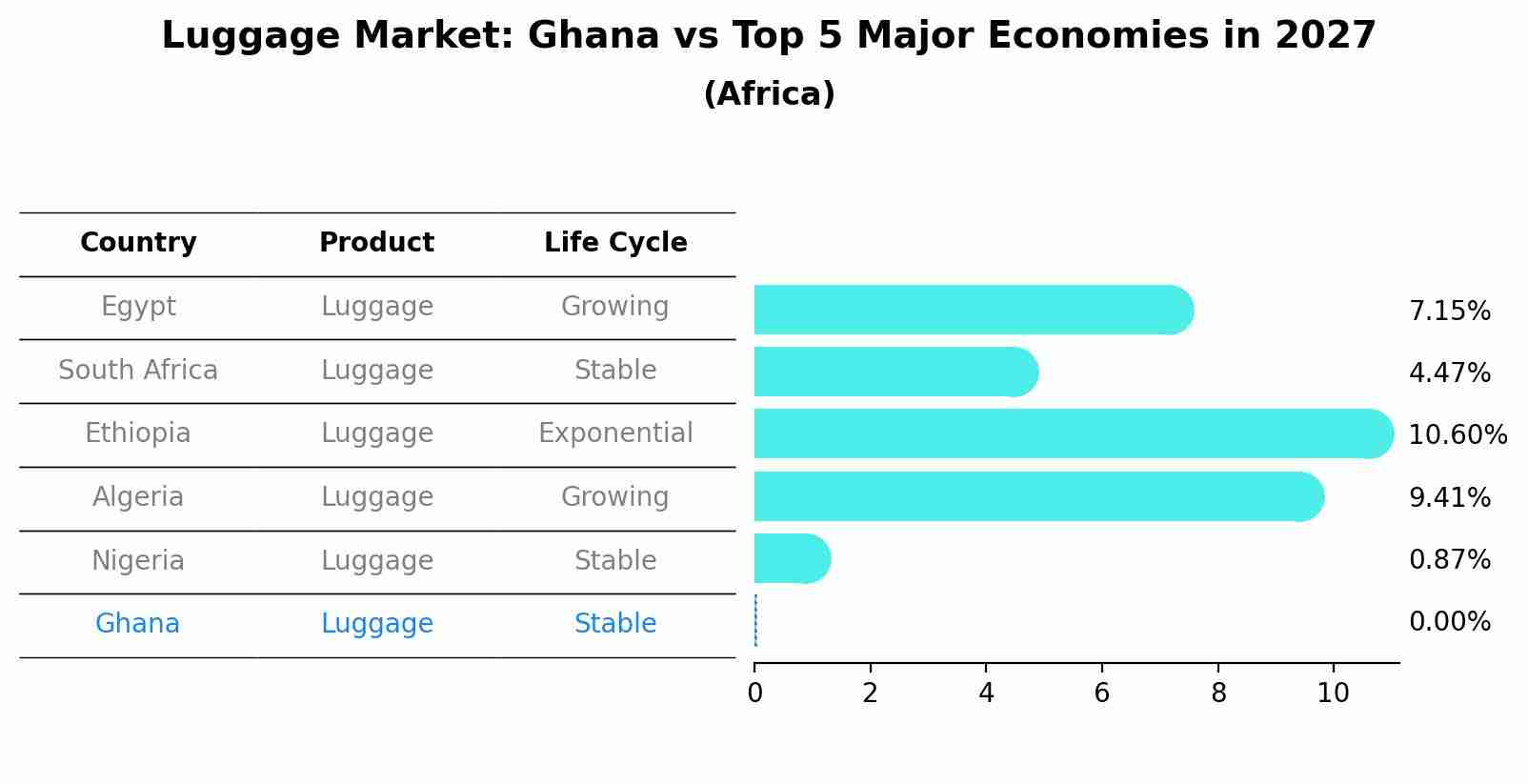Ghana Luggage Market (2025-2031) | Industry, Companies, Value, Growth, Share, Size, Trends, Analysis, Revenue, Forecast & Outlook
| Product Code: ETC011716 | Publication Date: Oct 2020 | Updated Date: Jun 2025 | Product Type: Report | |
| Publisher: 6Wresearch | Author: Sumit Sagar | No. of Pages: 70 | No. of Figures: 35 | No. of Tables: 5 |
Ghana Luggage Market Size Growth Rate
The Ghana Luggage Market is poised for steady growth rate improvements from 2025 to 2029. From 0.00% in 2025, the growth rate steadily ascends to 0.00% in 2029.

Luggage Market: Ghana vs Top 5 Major Economies in 2027 (Africa)
In the Africa region, the Luggage market in Ghana is projected to expand at a stable growth rate of 0.00% by 2027. The largest economy is Egypt, followed by South Africa, Ethiopia, Algeria and Nigeria.

Ghana Luggage Market Overview
The Ghana luggage market is experiencing steady growth driven by factors such as increasing travel and tourism activities, rising disposable incomes, and expanding middle-class population. Consumers in Ghana are increasingly looking for durable, fashionable, and affordable luggage options, leading to a growing demand for both domestic and international luggage brands. The market offers a range of products including suitcases, travel bags, backpacks, and business cases, catering to various travel needs and preferences. Key players in the Ghana luggage market include both local manufacturers and international brands, providing a competitive landscape with a wide variety of choices for consumers. The market is expected to continue growing as Ghana`s economy develops further and more individuals engage in domestic and international travel.
Ghana Luggage Market Trends
The Ghana luggage market is experiencing a shift towards more lightweight and durable materials, as consumers seek products that are both stylish and functional. There is a growing demand for smart luggage with features such as USB charging ports and GPS tracking capabilities. Eco-friendly luggage options made from sustainable materials are also gaining popularity among environmentally conscious consumers. The rise of online shopping has led to an increase in the sale of luggage through e-commerce platforms, providing customers with a wider range of options and convenient shopping experiences. Additionally, customization and personalization services are becoming more prevalent, allowing consumers to tailor their luggage to suit their individual preferences and needs. Overall, the Ghana luggage market is evolving to meet the changing demands and priorities of consumers.
Ghana Luggage Market Challenges
In the Ghana luggage market, there are several challenges that impact both consumers and businesses. One major challenge is the prevalence of counterfeit products, which can undermine the reputation of genuine brands and affect consumer trust. Additionally, the lack of consistent quality control measures in the market can lead to varying levels of product quality and durability, making it difficult for consumers to make informed purchasing decisions. Limited access to a wide range of international luggage brands also restricts consumer choices and can hinder the growth of the market. Furthermore, the high cost of importing luggage due to taxes and tariffs can result in inflated prices for consumers, making it challenging for businesses to compete effectively. Overall, addressing these challenges is crucial for the Ghana luggage market to thrive and provide consumers with quality products at affordable prices.
Ghana Luggage Market Investment Opportunities
The Ghana luggage market presents promising investment opportunities due to the country`s growing tourism industry and increasing disposable income levels. With more Ghanaians traveling domestically and internationally, there is a rising demand for high-quality and trendy luggage products. Investors can consider opportunities in manufacturing and distributing a variety of luggage types such as suitcases, backpacks, and travel accessories to cater to this market. Additionally, there is potential for e-commerce platforms specializing in luggage sales to tap into the convenience-seeking consumer base. Collaborations with local tourism agencies and airlines can also enhance market penetration. Overall, the Ghana luggage market is poised for growth, making it an attractive sector for investors seeking to capitalize on the expanding travel and leisure trends in the region.
Ghana Luggage Market Government Policy
The government of Ghana has implemented policies to regulate the luggage market, including import tariffs and regulations to ensure quality and safety standards are met. Import duties on luggage items vary depending on the material and value of the products. Additionally, the government has established guidelines for labeling and packaging requirements to protect consumers and prevent counterfeit products from entering the market. These policies aim to promote fair competition among both local and international luggage manufacturers and retailers, while also ensuring that consumers have access to high-quality and safe products. Compliance with these regulations is essential for businesses operating in the Ghana luggage market to avoid penalties and maintain a positive reputation in the industry.
Ghana Luggage Market Future Outlook
The future outlook for the Ghana Luggage Market looks promising as the country`s tourism industry continues to grow, leading to increased demand for travel-related products. With rising disposable incomes and a growing middle-class population, consumers are expected to prioritize quality and durability when purchasing luggage items. Additionally, the trend of international travel among Ghanaians is on the rise, further boosting the demand for luggage products. The market is also witnessing a shift towards eco-friendly and sustainable luggage options, driven by increasing awareness of environmental issues. Overall, the Ghana Luggage Market is expected to experience steady growth in the coming years, presenting opportunities for both local and international luggage brands to expand their presence in the market.
Key Highlights of the Report:
- Ghana Luggage Market Outlook
- Market Size of Ghana Luggage Market, 2024
- Forecast of Ghana Luggage Market, 2026
- Historical Data and Forecast of Ghana Luggage Revenues & Volume for the Period 2021 - 2031
- Ghana Luggage Market Trend Evolution
- Ghana Luggage Market Drivers and Challenges
- Ghana Luggage Price Trends
- Ghana Luggage Porter's Five Forces
- Ghana Luggage Industry Life Cycle
- Historical Data and Forecast of Ghana Luggage Market Revenues & Volume By Product Type for the Period 2021 - 2031
- Historical Data and Forecast of Ghana Luggage Market Revenues & Volume By Travel Luggage for the Period 2021 - 2031
- Historical Data and Forecast of Ghana Luggage Market Revenues & Volume By Casual Luggage for the Period 2021 - 2031
- Historical Data and Forecast of Ghana Luggage Market Revenues & Volume By Business Luggage for the Period 2021 - 2031
- Historical Data and Forecast of Ghana Luggage Market Revenues & Volume By Sports Luggage for the Period 2021 - 2031
- Historical Data and Forecast of Ghana Luggage Market Revenues & Volume By Other Product Types for the Period 2021 - 2031
- Historical Data and Forecast of Ghana Luggage Market Revenues & Volume By Distribution Channel for the Period 2021 - 2031
- Historical Data and Forecast of Ghana Luggage Market Revenues & Volume By Online for the Period 2021 - 2031
- Historical Data and Forecast of Ghana Luggage Market Revenues & Volume By Offline for the Period 2021 - 2031
- Ghana Luggage Import Export Trade Statistics
- Market Opportunity Assessment By Product Type
- Market Opportunity Assessment By Distribution Channel
- Ghana Luggage Top Companies Market Share
- Ghana Luggage Competitive Benchmarking By Technical and Operational Parameters
- Ghana Luggage Company Profiles
- Ghana Luggage Key Strategic Recommendations
Frequently Asked Questions About the Market Study (FAQs):
1 Executive Summary |
2 Introduction |
2.1 Key Highlights of the Report |
2.2 Report Description |
2.3 Market Scope & Segmentation |
2.4 Research Methodology |
2.5 Assumptions |
3 Ghana Luggage Market Overview |
3.1 Ghana Country Macro Economic Indicators |
3.2 Ghana Luggage Market Revenues & Volume, 2019 & 2026F |
3.3 Ghana Luggage Market - Industry Life Cycle |
3.4 Ghana Luggage Market - Porter's Five Forces |
3.5 Ghana Luggage Market Revenues & Volume Share, By Product Type, 2019 & 2026F |
3.6 Ghana Luggage Market Revenues & Volume Share, By Distribution Channel, 2019 & 2026F |
4 Ghana Luggage Market Dynamics |
4.1 Impact Analysis |
4.2 Market Drivers |
4.3 Market Restraints |
5 Ghana Luggage Market Trends |
6 Ghana Luggage Market, By Types |
6.1 Ghana Luggage Market, By Product Type |
6.1.1 Overview and Analysis |
6.1.2 Ghana Luggage Market Revenues & Volume, By Product Type, 2016 - 2026F |
6.1.3 Ghana Luggage Market Revenues & Volume, By Travel Luggage, 2016 - 2026F |
6.1.4 Ghana Luggage Market Revenues & Volume, By Casual Luggage, 2016 - 2026F |
6.1.5 Ghana Luggage Market Revenues & Volume, By Business Luggage, 2016 - 2026F |
6.1.6 Ghana Luggage Market Revenues & Volume, By Sports Luggage, 2016 - 2026F |
6.1.7 Ghana Luggage Market Revenues & Volume, By Other Product Types, 2016 - 2026F |
6.2 Ghana Luggage Market, By Distribution Channel |
6.2.1 Overview and Analysis |
6.2.2 Ghana Luggage Market Revenues & Volume, By Online, 2016 - 2026F |
6.2.3 Ghana Luggage Market Revenues & Volume, By Offline, 2016 - 2026F |
7 Ghana Luggage Market Import-Export Trade Statistics |
7.1 Ghana Luggage Market Export to Major Countries |
7.2 Ghana Luggage Market Imports from Major Countries |
8 Ghana Luggage Market Key Performance Indicators |
9 Ghana Luggage Market - Opportunity Assessment |
9.1 Ghana Luggage Market Opportunity Assessment, By Product Type, 2019 & 2026F |
9.2 Ghana Luggage Market Opportunity Assessment, By Distribution Channel, 2019 & 2026F |
10 Ghana Luggage Market - Competitive Landscape |
10.1 Ghana Luggage Market Revenue Share, By Companies, 2024 |
10.2 Ghana Luggage Market Competitive Benchmarking, By Operating and Technical Parameters |
11 Company Profiles |
12 Recommendations |
13 Disclaimer |
- Single User License$ 1,995
- Department License$ 2,400
- Site License$ 3,120
- Global License$ 3,795
Search
Thought Leadership and Analyst Meet
Our Clients
Related Reports
- South Africa Stationery Market (2025-2031) | Share, Size, Industry, Value, Growth, Revenue, Analysis, Trends, Segmentation & Outlook
- Afghanistan Rocking Chairs And Adirondack Chairs Market (2026-2032) | Size & Revenue, Competitive Landscape, Share, Segmentation, Industry, Value, Outlook, Analysis, Trends, Growth, Forecast, Companies
- Afghanistan Apparel Market (2026-2032) | Growth, Outlook, Industry, Segmentation, Forecast, Size, Companies, Trends, Value, Share, Analysis & Revenue
- Canada Oil and Gas Market (2026-2032) | Share, Segmentation, Value, Industry, Trends, Forecast, Analysis, Size & Revenue, Growth, Competitive Landscape, Outlook, Companies
- Germany Breakfast Food Market (2026-2032) | Industry, Share, Growth, Size, Companies, Value, Analysis, Revenue, Trends, Forecast & Outlook
- Australia Briquette Market (2025-2031) | Growth, Size, Revenue, Forecast, Analysis, Trends, Value, Share, Industry & Companies
- Vietnam System Integrator Market (2025-2031) | Size, Companies, Analysis, Industry, Value, Forecast, Growth, Trends, Revenue & Share
- ASEAN and Thailand Brain Health Supplements Market (2025-2031) | Strategy, Consumer Insights, Analysis, Investment Trends, Opportunities, Growth, Size, Share, Industry, Revenue, Segments, Value, Segmentation, Supply, Forecast, Restraints, Outlook, Competition, Drivers, Trends, Demand, Pricing Analysis, Competitive, Strategic Insights, Companies, Challenges
- ASEAN Bearings Market (2025-2031) | Strategy, Consumer Insights, Analysis, Investment Trends, Opportunities, Growth, Size, Share, Industry, Revenue, Segments, Value, Segmentation, Supply, Forecast, Restraints, Outlook, Competition, Drivers, Trends, Demand, Pricing Analysis, Competitive, Strategic Insights, Companies, Challenges
- Europe Flooring Market (2025-2031) | Outlook, Share, Industry, Trends, Forecast, Companies, Revenue, Size, Analysis, Growth & Value
Industry Events and Analyst Meet
Whitepaper
- Middle East & Africa Commercial Security Market Click here to view more.
- Middle East & Africa Fire Safety Systems & Equipment Market Click here to view more.
- GCC Drone Market Click here to view more.
- Middle East Lighting Fixture Market Click here to view more.
- GCC Physical & Perimeter Security Market Click here to view more.
6WResearch In News
- Doha a strategic location for EV manufacturing hub: IPA Qatar
- Demand for luxury TVs surging in the GCC, says Samsung
- Empowering Growth: The Thriving Journey of Bangladesh’s Cable Industry
- Demand for luxury TVs surging in the GCC, says Samsung
- Video call with a traditional healer? Once unthinkable, it’s now common in South Africa
- Intelligent Buildings To Smooth GCC’s Path To Net Zero


















